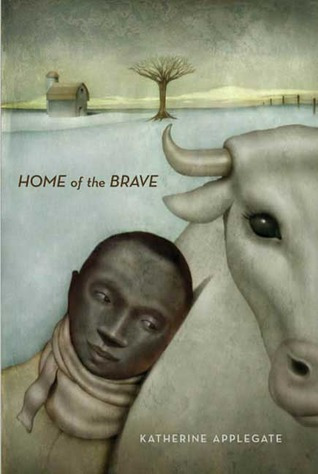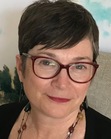HOME OF THE BRAVE and THE SECRET LANGUAGE OF STORIES
One of the verse novels I read for poetry month was HOME OF THE BRAVE, by Katherine Applegate.
 It is the story of a teenage boy named Kek, a Sudanese refugee who saw his father and brother killed in Africa and then came to America to live with his aunt. The spare verse is accessible for students ages 10 and up, yet the themes of relocation, ostracism, and political oppression make this book of interest for high school students as well, especially low readers (high interest-low readability). It fits well with themes of African studies. The variety of poetic and literary devices found in this story make it a good resource for covering those topics in preparation for SBA testing. I will be using the 12 steps of my story analysis method I call THE SECRET LANGUAGE OF STORIES (SLOS) to talk about the plot. To learn more about SLOS see the tab on this blog. Kek, a young Sudanese refugee receives a CALL to adventure to leave his refugee camp and come to America. As the story begins, he is making his CROSSING from the OLD WORLD of the camp to the NEW WORLD of Minnesota in the dead of winter by way of a "flying boat" or airplane. He is met at the airport by Dave, a man assigned to help him make the transition to America. Dave serves as a MENTOR as he gives Kek advice about adjusting to his new live. The boy was reluctant to come to America without his mother and hopes that she will soon join him. Dave takes Kek to live with Kek's aunt and cousin Ganwar who lost his hand the same night Kek's father was killed.
It is the story of a teenage boy named Kek, a Sudanese refugee who saw his father and brother killed in Africa and then came to America to live with his aunt. The spare verse is accessible for students ages 10 and up, yet the themes of relocation, ostracism, and political oppression make this book of interest for high school students as well, especially low readers (high interest-low readability). It fits well with themes of African studies. The variety of poetic and literary devices found in this story make it a good resource for covering those topics in preparation for SBA testing. I will be using the 12 steps of my story analysis method I call THE SECRET LANGUAGE OF STORIES (SLOS) to talk about the plot. To learn more about SLOS see the tab on this blog. Kek, a young Sudanese refugee receives a CALL to adventure to leave his refugee camp and come to America. As the story begins, he is making his CROSSING from the OLD WORLD of the camp to the NEW WORLD of Minnesota in the dead of winter by way of a "flying boat" or airplane. He is met at the airport by Dave, a man assigned to help him make the transition to America. Dave serves as a MENTOR as he gives Kek advice about adjusting to his new live. The boy was reluctant to come to America without his mother and hopes that she will soon join him. Dave takes Kek to live with Kek's aunt and cousin Ganwar who lost his hand the same night Kek's father was killed.On their way to his aunt's apartment, Kek sees a cow standing alone in the snow and asks Dave to stop so that he can pet the animal. Back in Africa, cattle meant life to Kek and his family who were herders.
Kek faces many challenges in making the adjustment to America. The language is totally confusing to him. He uses terms like "the fast-car road" to describe the highway and "the don't-move belt" to describe the seatbelt. Nothing is like it is back home. He looks up to his older cousin, Ganwar, who has already gone through the male initiation rite and bears the scars on his forehead that prove he is a man. Kek very much wants to become a man, but does not know how to do that in this strange new place. Ganwar is a very flawed and embittered role model.
A PROBLEM arises when Kek tries to wash his aunt's dishes in the washing machine in the basement and ends up breaking them. He makes a PLAN to repay her by going back to the farm where he saw the cow and asking the owner, a woman named Lou, if he can have a job. At the MIDPOINT of the story he does just that. He asks Lou for a job. During the DOWNTIME he enjoys his new employment and even PURSUES a position for his cousin Ganwar. Kek names the cow Gol which means family. Gol symbolizes both his family and his search for manhood because of the responsibility he assumes in caring for the cow.
Unfortunately, Lou is getting old and she decides to sell the farm. She's not sure what she's going to do with the old cow. Kek becomes despondent with this news and quits going to the farm. Shortly thereafter he receives news that Dave was able to track down the people who made it to the second refugee camp and Kek's mother was not with them. He then has a flashback about what happened the night she disappeared. Their camp was attacked by gunfire and they ran. His mother hurt her leg and couldn't go any further, but instructed him to keep running and return for her when it was safe. When he returned, she was gone. This is the DEATH and TRANSFORMATION point in the story, because all hope seems lost. At first this desperation just causes Kek to run away, to try to make it back to Africa to look for his mother, but as he passes the farm and Lou's house, he wants to tell her thank you and goodbye, so he gets off the bus. Lou shows him pictures of her and her husband and the farm when they were young. Then she shows him a picture of her sister's house in LA. She says she is hopeful because even though her sister's yard is tiny in comparison to the farm, she can grow things year round. Kek realizes that like him, Lou must leave the home she has always known. He remembers his aunt's words, "Kek finds sun when the sky is dark," and he realizes that finding the sun wherever you are is one way to be a man. His transformation occurs when he decides to go back to work for Lou as he stays in Minnesota and waits for his mother and tries to make the best of his new life.
At the CLIMAX of the story Kek, with Lou's permission, walks Gol, the cow, all the way to the zoo. He and Ganwar stop traffic and end up getting a police escort. When they arrive at the zoo the "zoo boss" is reluctant to accept the cow. This is not the way animals are usually acquired. Kek finally persuades him and as Gol is taken into the petting zoo, he makes the analogy the she is going to her new land to begin again. The REWARD is that he has found a place for Gol, but another reward awaits him. In the epilogue, his mother finally meets him in America.
I have created a 17 page teacher's guide that focuses primarily on exploring the poetic and literary devices found in the novel. It is geared toward low readers and may be found on the Teacher Resources page on this blog.
Published on April 27, 2012 06:00
No comments have been added yet.



